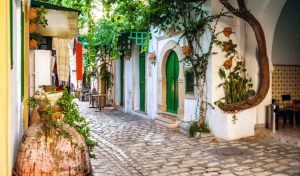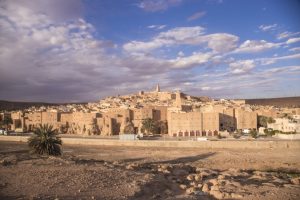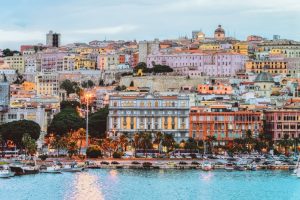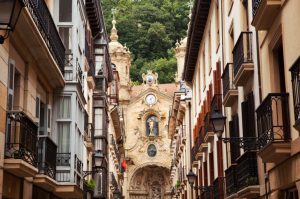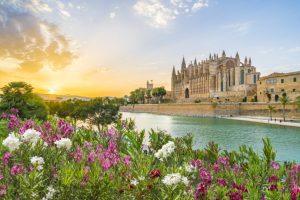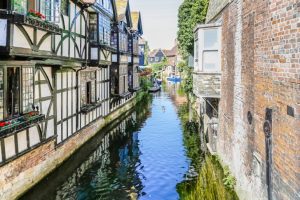 Tunisia : Safety by City
Tunisia : Safety by City
Tunisia - safety as a country Sidi Bou Said is a culturally diverse country that borders the glistening Mediterranean Sea.
Its natural beauty and warm climate beckons tourists from around the globe to indulge in world-class beaches, food, and local culture.
If you are planning a trip to Sidi Bou Said and wondering how to prepare for local warnings and dangers in the area, this is the guide for you!
Our guide provides an overview of Sidi Bou Said, Tunisia along with useful information about crime, safety, weather, culture, and dangers to look out for.
Dive in to learn where about the safest areas of Sidi Bou Said for tourists to visit and learn which areas of the country to avoid in the comprehensive guide below.
Warnings & Dangers in Sidi Bou Said

OVERALL RISK: MEDIUM
Traveling to Sidi Bou Said poses an average risk of being the victim of a petty, property, or personal crime while traveling abroad within populated areas of the region. High levels of security in Sidi Bou Said contribute to low to moderate instances of crime within most of the central parts of the city. The medium-high risk rating is based on the fact that there are increasing dangers for US travelers who venture outside of the safety of tourist areas and major cities. Pockets of anti-Western sentiment are growing around the country and manifesting in the forms of property crime, personal crime, and terrorism against people who are easily identifiable as originating from the West.

TRANSPORT & TAXIS RISK: MEDIUM
Visitors traveling to well-populated attractions like the Cafe des Delices in Sidi Bou Said can feel relatively safe using local transport and taxis with the beefed-up security forces in the region surrounding populated cities, local hotels, and tourist attractions. Newcomers should be aware that traffic stops by local officials are common as they work to keep the streets of Sidi Bou Said safe. Local authorities may request to search vehicles, purses, and bags in an effort to curb crime.

PICKPOCKETS RISK: HIGH
Tunisia travelers should remain vigilant and take travel safety precautions to stay a step ahead of local pickpockets and thieves. Although Sidi Bou Said is a relatively safe area (when travelers remain in secure areas), pockets of crime do exist, and pickpocketing and muggings do happen in populated areas and crowds. Avoid traveling with expensive belongings or cash on your person to reduce the likelihood of pickpocketing.

NATURAL DISASTERS RISK: HIGH
While Tunisia offers a coastal safe haven and unique attractions for tourists, its geography places it in a seismically active zone. Areas of the country can experience natural disasters such as earthquakes, volcanoes, wildfires, droughts, and localized flooding caused by rising sea levels. Travelers should develop a natural disaster safety and escape plan before arriving in the country.

MUGGING RISK: MEDIUM
Well-patrolled streets and public venues make the likelihood of becoming a mugging victim substantially lower in Sidi Bou Said than in nearby border towns and neighboring cities like Sidi Bou Zid. The mugging risk for travelers and locals is moderate. Sightseers and tourists should keep their eyes open for suspicious-looking characters and avoid unfamiliar or abandoned neighborhoods to reduce their mugging risk levels.

TERRORISM RISK: MEDIUM
Sections of Tunisia are under a Level 2 Travel Advisory telling travelers to exercise caution when visiting Sidi Bou Said. Incoming visitors need to note that certain sections of the country and towns bordering the city are under a more aggressive Level 4 Do Not Travel Advisory because of ongoing terrorism and civil unrest resulting in pockets of violence in and around the borders of Libya and neighboring countries.

SCAMS RISK: HIGH
This area of the country is known for its numerous tourist traps and scams. Corruption and bribery rates in Sidi Bou Said are high, and local scammers collaborate with networks of thieves that can include local street vendors, taxi drivers, cafe owners, hotel staff, and public transportation operators. These thieves raise prices on local goods and services for unsuspecting tourists.

WOMEN TRAVELERS RISK: MEDIUM
Women traveling alone through Sidi Bou Said should take common sense precautions to avoid becoming the victim of unwanted advances or other crimes. Avoid traveling alone, especially at night, adhere to local customs, and use the services of a verified and reputable tour guide when possible to stay safer while traveling in Tunisia.

TAP WATER RISK: HIGH
The water purification methods in Sidi Bou Said drastically differ from treatment, filtering, and purification processes in the US. Previous travelers to Sidi Bou Said have reported gastrointestinal issues after drinking local water straight from the tap. Avoid potential stomach issues by drinking bottled water when traveling in the region.
Safest Places to Visit in Sidi Bou Said
Now that you’re familiar with some of the most common warnings and dangers to avoid when traveling in Tunisia, let’s discuss a few of the safe places for tourists to enjoy.
The following areas have been deemed safe by local officials and previous visitors.
- The Medina: Tourists seeking to explore central parts of town can visit The Medina, also known as Old Town. This area is filled with a variety of local shops, cafes, and world-class restaurants in a relatively secure environment.
- Sidi Bou Said Park: Globetrotters looking for a serene place to relax and unwind can find solace at the Sidi Bou Said Park, which offers stunning views of the Mediterranean Sea. This popular local attraction provides hours of endless enjoyment in a safe and natural environment.
- Cafe des Nattes: Tunisian travelers can get a taste of local cuisine and culture when they visit the Cafe des Nettes near the main square in Sidi Bou Said. This popular meeting spot is in a safe zone where tourists and locals enjoy local staples like Tunisian mint tea and coffee.
Places to Avoid in Sidi Bou Said
While many central areas of Sidi Bou Said are safe for tourists to visit, there are a few areas around the city to avoid due to lower levels of security and a rise in terrorism.
Americans traveling in Tunisia can stay safer by heeding the advice of the US Department of State and local Tunisian officials.
Travelers should understand that the rules and laws of Tunisia and its neighboring countries may drastically differ from the United States.
Not adhering to local laws and customs can land US travelers in hot water.
As such, it is crucial to complete your due diligence by researching local rules, laws, customs, and penalties before traveling.
US Department of State: Advisory Levels for Tunisia Travel
- Level 2 Travel Advisory – Take moderate precautions during travel, and use common sense travel safety tips.
- Level 4 Travel Advisory – Do Not Travel to the areas specified below.
The elevated Level 4 travel advisory is a strict warning for US travelers, as help, support, or resources may not be available to you or your travel party in the event of an emergency.
Level 4 Do Not Travel Advisories for areas near Sidi Bou Said and neighboring border countries, include the following locations.
- Algeria
- Libya
- Mount Chaambi National Park
- Mount Salloum
- Mount Sammamam
- Mount Mghlia
- Mount Orbata
- Sahara Desert – South of Ramada
Land travel across most areas of the Sahara Desert is inadvisable.
Americans who visit areas deemed as unsafe or inadvisable for non-essential travel should avoid getting caught up in any local political demonstrations and large crowds as there is growing civil unrest and anti-Western sentiment in and near the city.
Safety Tips for Traveling to Sidi Bou Said
- Arabic is the primary local language of Tunisia and neighboring countries. Visitors should learn basic Arabic for easier communication with locals.
- There are high numbers of tourist traps and scams in and around the city. Stay safer by doing business with reputable service providers with verifiable reviews.
- Hire a reputable tour guide when possible for ease of navigation around the city, country, and local attractions.
- The local culture of Tunisia is conservative, and it has a conservative dress code. Research local dress code customs and dress accordingly.
- The anti-Western sentiment is growing in and around Tunisia. Register your trip with the US Department of State’s STEP program in case of emergency.
- Avoid large crowds and political demonstrations to reduce the risk of terrorism, pickpocketing, or muggings.
- Drink bottled water to reduce the likelihood of having stomach-related issues while traveling in Tunisia.
- Keep bottled water with you at all times.
- The rules for how much local currency you can carry or import are strict. Learn the rules for importing and exporting currency in Tunisia before you arrive.
- High temperatures can lead to extreme dehydration or heat exhaustion. Stay hydrated and wear sunscreen to stay safer.
So... How Safe Is Sidi Bou Said Really?
The overall safety of traveling to Sidi Bou Said can vary by location and the purpose of your travel.
Westerners and US-based travelers should be aware of the growing anti-Western sentiment in the country and the related potential for violence and terror.
Many interior venues of the city are considered relatively safe for travelers during daylight hours as they are well-patrolled by local law enforcement officials.
Explorers who venture outside the city may be at greater risk for crimes of opportunity, such as pickpocketing, robbery, and petty theft.
The US Department of State has highlighted some areas in and around Sidi Bou Said as designated Do Not Travel zones.
Safety issues and concerns about terrorism against US travelers are high, and the local US Embassy may be unable to provide rescue or support to travelers who venture into unsafe zones.
Visit the US Department of State website to learn more about the latest travel advisories for Tunisia and border countries.
How Does Sidi Bou Said Compare?
| City | Safety Index |
|---|---|
| Sidi Bou Said | 42 |
| Djerba | 53 |
| Tunis | 59 |
| Hammamet | 78 |
| Bab Bhar | 56 |
| Mahdia | 32 |
| Kairouan Medina | 52 |
| Niagara Falls (Canada) | 87 |
| Calgary (Canada) | 82 |
| Buenos Aires (Argentina) | 60 |
| Vancouver (Canada) | 82 |
| Cordoba (Argentina) | 61 |
| Toronto (Canada) | 81 |
Useful Information

Visas
Americans traveling to Tunisia will need a valid passport to enter the country. They can stay for up to 90 days without being required to apply for a Visa or residency. People planning on staying in the country for longer than 90 days will need to apply for a residence permit.

Currency
People traveling to Tunisia from the US and other countries should note that the government has strict rules for importing and exporting currency. The local currency of Tunisia is the Dinar TND. Officials require tourists to declare cash imports totaling over 10,000 TND.

Weather
Tunisia's climate includes a mix of semi-arid, Mediterranean, and desert climates that can make for skyrocketing temperatures during the hottest part of the year. Central Tunisia experiences even higher temperatures than coastal regions.

Airports
People traveling to Tunisia by air can expect to make numerous connections to reach their destination. There are few direct flights to the local Boumediene Airport (ALG). Air travelers usually take connecting flights from international airports in Europe or the Middle East.

Travel Insurance
International travel experts recommend getting travel insurance to protect your Tunisia trip from unexpected emergencies, such as lost baggage or passports, detention by local officials, and medical emergencies while traveling abroad.
Sidi Bou Said Weather Averages (Temperatures)
Average High/Low Temperature
| Temperature / Month | Jan | Feb | Mar | Apr | May | Jun | Jul | Aug | Sep | Oct | Nov | Dec |
|---|---|---|---|---|---|---|---|---|---|---|---|---|
| High °C | 16 | 16 | 18 | 21 | 25 | 30 | 33 | 33 | 30 | 26 | 20 | 17 |
| Low °C | 7 | 7 | 8 | 10 | 14 | 18 | 20 | 21 | 19 | 16 | 11 | 8 |
| High °F | 61 | 61 | 64 | 70 | 77 | 86 | 91 | 91 | 86 | 79 | 68 | 63 |
| Low °F | 45 | 45 | 46 | 50 | 57 | 64 | 68 | 70 | 66 | 61 | 52 | 46 |
Tunisia - Safety by City
| City | Safety Index |
|---|---|
| Bab Bhar | 56 |
| Djerba | 53 |
| Hammamet | 78 |
| Kairouan Medina | 52 |
| Mahdia | 32 |
| Sidi Bou Said | 42 |
| Sousse | 48 |
| Tunis | 59 |

